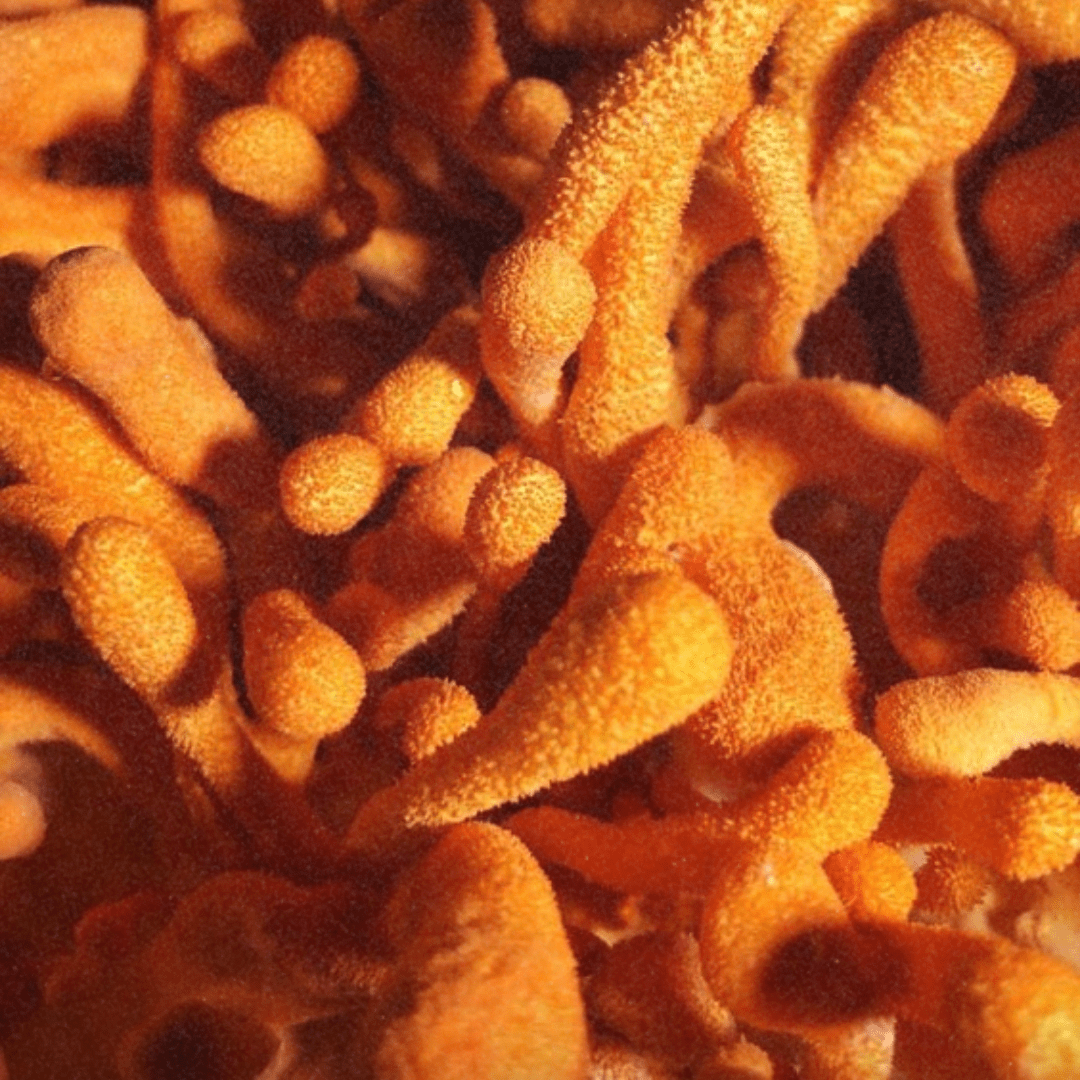
Embark on a transformative journey into the realm of Cordyceps, an ancient superfood deeply ingrained in the annals of traditional Chinese medicine. Revered for centuries, Cordyceps mushrooms are a treasure trove of health benefits, poised to revolutionise our approach to natural wellness.
Originating from the high mountainous regions of China, Cordyceps mushrooms have an intriguing lifecycle, flourishing on caterpillars to form one of the most unique health supplements known to man. Their rarity in the wild adds to their mystique and value, making them a prized ingredient in traditional remedies.
Thanks to advancements in science, the extraordinary properties of Cordyceps are now more accessible than ever. Cultivated in laboratories, these lab-grown varieties offer us the chance to experience the myriad benefits of Cordyceps without the challenges of sourcing them from the wild. This step into modern cultivation is a leap towards democratising this ancient health secret.
As we delve into the world of Cordyceps, we're not just exploring a supplement; we're unlocking the door to enhanced vitality and well-being. Join us as we uncover the myriad ways in which Cordyceps can enrich our lives, offering a harmonious blend of age-old wisdom and contemporary health.
What are Cordyceps Mushrooms?
Cordyceps mushrooms, a marvel of the natural world, stand at the intersection of nature and the seemingly otherworldly. Belonging to a unique genus of fungi, they have a life cycle straight out of a science fiction narrative. These fungi transform insect larvae into a nutrient powerhouse, eventually giving rise to elongated, fruiting bodies. This remarkable process, steeped in centuries of Traditional Chinese Medicine, is celebrated for its ability to combat fatigue, enhance vitality, and even boost libido.
Distinguished by their extraordinary growth habits, Cordyceps mushrooms are far from your average fungi. They are hailed for their potential medicinal prowess, which transcends the usual expectations from a mushroom.
Cordyceps extracts have been noted for their ability to boost immunity, triggering the activation of various cells and chemicals in the immune system. They are also lauded for their alleged benefits in enhancing athletic performance, addressing renal and hepatic health, and improving sexual well-being. However, while these benefits are widely acknowledged in traditional practices, it is crucial to approach them with a discerning eye, as substantial scientific evidence is still evolving [1].
As we delve deeper, let's explore the extensive benefits that Cordyceps mushrooms offer, uncovering the blend of ancient wisdom and modern understanding.

Enhancing Your Workout Performance with Cordyceps
Cordyceps is believed to boost the body's endurance and optimal performance levels. It is known to produce adenosine triphosphate (ATP), a vital energy source for muscles at the cellular level. This enhancement could lead to better oxygen utilisation during physical activities. [2]
In a notable study, 30 healthy older adults were given a daily dose of 3-grams of a lab-created Cordyceps strain (CS-4) or a placebo for six weeks. The results were intriguing: those who took CS-4 experienced a 7% increase in VO2 max – a key indicator of fitness level – while the placebo group saw no change.

Another study involving 20 healthy older adults followed a similar pattern. For 12 weeks, participants received either 1 gram of CS-4 or a placebo. Although there was no significant change in VO2 max in either group, those who took CS-4 improved in various exercise performance metrics. That is why Cordyceps remains a topic of interest for its potential benefits in exercise and fitness. [3]
Anti-inflammatory properties
Several studies have highlighted a key ingredient in cordyceps called cordycepin. It is known for its anti-inflammatory properties. This component is especially beneficial for conditions like [4]
- Asthma
- Rheumatoid arthritis
- Parkinson’s disease
- Hepatitis
Cordycepin is so effective that it is considered a nutraceutical, meaning it's a food with medicinal properties. Research in labs has shown that cordycepin and cordyceps polysaccharides may also positively impact obesity, which is often linked to chronic low-level inflammation. [5]
Cordyceps mushrooms are emerging as a potential superfood in the battle against inflammation, a key factor in overall health and wellness. The anti-inflammatory properties of Cordyceps are drawing attention for their role in promoting a healthier, more balanced bodily response. While the promise of Cordyceps in enhancing wellness through inflammation reduction is compelling, the current body of research, primarily based on preclinical studies, calls for more extensive human clinical trials to solidify these findings and fully understand the scope of Cordyceps' benefits in human health.
Anti-Aging Properties
Cordyceps has long been valued by the elderly for enhancing strength and reducing fatigue. Now, it is being studied for its anti-ageing properties. Researchers link these potential benefits to the high antioxidant content in Cordyceps. Antioxidants are crucial as they neutralise free radicals, minimising cell damage and slowing ageing.

Interestingly, studies involving aged mice have shown that Cordyceps can boost antioxidant levels. It eventually led to improved memory and sexual function. This suggests that Cordyceps could play a role in combating age-related decline in these areas. [6]
One study even demonstrated that mice given Cordyceps lived several months. Similarly, research with fruit flies found that their lifespan extended with Cordyceps, supporting the idea of its anti-ageing benefits. [7]
However, it's important to note that the anti-aging effects of Cordyceps in humans are still not fully understood. More research is needed.
Boost Libido
For centuries, Cordyceps has played a tantalising role in Traditional Chinese Medicine, particularly in the realm of sexual wellness. Known for its intriguing ability to spice up the bedroom scene, it has been a go-to remedy for various sexual dysfunctions in both men and women. Addressing issues from waning libidos to challenges in arousal and orgasm, Cordyceps has been the hush-hush secret of ancient healers.

Now, modern science is beginning to flirt with this ancient wisdom. A study by the National Institutes of Health (NIH) offers a tantalising glimpse into Cordyceps' potential in this arena. This research highlights how Cordyceps supplements could play Cupid by boosting total sperm count, increasing the motility of those little swimmers, and even giving a nudge to serum testosterone levels [8].
As intriguing as these findings are, they're just the beginning of a deeper exploration into Cordyceps' prowess in sexual health. And speaking of natural aphrodisiacs, keep your eyes peeled for something exciting from Lucid! After diving deep into the world of Maca and its libido-boosting secrets, we're brewing up a cheeky blend with Cordyceps that might just be the natural spark you've been looking for. Remember, though, while the whispers of ancient lore are enticing, we're still on the journey of fully understanding and scientifically validating these claims.
Anti-Tumor Properties
The interest in Cordyceps for their potential anti-tumour properties has grown significantly in recent years. Researchers have been investigating how these fungi might fight tumours. Studies have revealed that Cordyceps can inhibit the growth of various human cancer cells, including those from lung, colon, skin, and liver cancers.
Further research in mice has also indicated the anti-tumour effects of Cordyceps on lymphoma, melanoma, and lung cancer. This suggests that Cordyceps might have broader applications in cancer treatment. [9]
Additionally, Cordyceps may offer benefits in counteracting side effects of cancer therapies, such as leukopenia. Leukopenia, not to be confused with leukaemia, is a condition where the number of white blood cells decreases, making the body more susceptible to infections.
Conclusion
As we journey through the rich tapestry of traditional Chinese medicine, Cordyceps emerges as a fascinating subject, steeped in history yet brimming with contemporary relevance. This remarkable fungus has captured the imagination of modern science, which is now beginning to unveil its plethora of potential health benefits. The studies conducted so far offer a hint at what Cordyceps might hold for us, opening doors to natural approaches for enhancing health and vitality.
While the intrigue surrounding Cordyceps is undeniable, it's essential to tread this path with a balanced perspective, blending optimism with a prudent approach. As the scientific community delves deeper, unravelling more comprehensive insights, Cordyceps continues to hold a spot of keen interest among those passionate about natural health solutions. This delicate dance between ancient wisdom and modern exploration makes Cordyceps a subject not just of study, but of wonder, promising a future where tradition and science converge for holistic well-being.
References
- Tuli, H. S., Sandhu, S. S., & Sharma, A. K. (2021). Pharmacological and therapeutic potential of Cordyceps with special reference to Cordycepin. Biomed Research International, 2021. https://doi.org/10.1155/2021/2060213
- Zhu, J. S., Halpern, G. M., & Jones, K. (2008). The scientific rediscovery of an ancient Chinese herbal medicine: Cordyceps sinensis: Part II. Journal of Alternative and Complementary Medicine, 4(4), 429-457. https://www.ncbi.nlm.nih.gov/books/NBK92758/
- Link, R. (n.d.). 6 Benefits of Cordyceps, All Backed by Science. Healthline. Retrieved from https://www.healthline.com/nutrition/cordyceps-benefits#TOC_TITLE_HDR_2
- Huang, Y., Lu, J., Shen, Y., & Lu, J. (2022). The protective effects of Cordyceps sinensis extract on extracellular matrix accumulation and epithelial-to-mesenchymal transition in renal tubular epithelial cells. Frontiers in Pharmacology, 13. https://doi.org/10.3389/fphar.2022.35208860
- Li, Z., Dong, J., Zhang, J., & Zhang, Y. (2022). Effect of Cordyceps Sinensis on gut microbiota in patients with chronic kidney disease: A pilot study. Frontiers in Pharmacology, 13. https://doi.org/10.3389/fphar.2022.35386146
- Bao, Q., Chen, Z., Xu, L., Wu, Y., & Zhu, F. (2016). Effect of Cordyceps sinensis on renal function of patients with chronic allograft nephropathy. Urologia Internationalis, 96(4), 436-442. https://doi.org/10.1159/000448682
- Chen, Y. C., Chen, Y. H., Pan, B. S., Chang, M. M., & Huang, B. M. (2015). Functional study of Cordyceps sinensis and cordycepin in male reproduction: A review. Journal of Food and Drug Analysis, 25(1), 197-205. https://www.ncbi.nlm.nih.gov/pmc/articles/PMC4564082/
- Kumar, R., Negi, P. S., & Singh, B. (2016). Cordyceps sinensis promotes exercise endurance capacity of rats by activating skeletal muscle metabolic regulators. Journal of Ethnopharmacology, 179, 347-355. https://www.ncbi.nlm.nih.gov/pmc/articles/PMC4791983/
- Holliday, J. C., & Cleaver, M. P. (2008). Medicinal value of the caterpillar fungi species of the genus Cordyceps (Fr.) Link (Ascomycetes): A review. International Journal of Medicinal Mushrooms, 10(3), 219-234. https://www.ncbi.nlm.nih.gov/pmc/articles/PMC2775070/




Maca Magic Revealed: How This Super Root is Changing Lives!